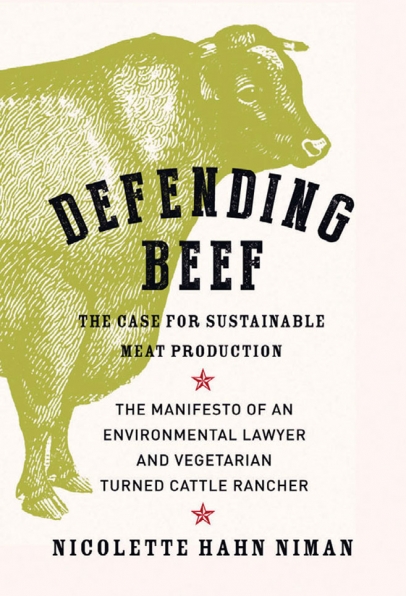Review of Defending Beef by Nicolette Hahn Niman
Defending Beef: The Case For Sustainable Meat Production
Because I am at once a writer, a cook, and an omnivore, I have been confronted many times by a zealous band of culinary evangelists know as vegans, and their somewhat less-strident cousins, the vegetarians. Let me say at the outset that I begrudge them nothing, despite having been repeatedly labeled “unethical,” “stupid,” “uncaring,” and “Satan-spawn” (really) because of the fact that I eat meat. Also, there is no doubt that it is only a small, albeit vocal, subset of them who are so militant in their execration of the meat-eating set. Aside from the occasional gentle ribbing or playful joke, I’ll make no disparaging comments about them in return.
A vegetarian diet can be a perfectly healthy way to eat, and can have less of an impact on the earth when compared with some carnivorous diets. The same is true of vegan diets, although complete sources of protein can prove to be more challenging.
Having said all that, I do wish that some of the more passionately vocal vegans and vegetarians would come to see that there are others in the world who do not see that world in the same way, and that fact alone does not make them worse people in any way. I think that is what Nicolette Hahn Niman was driving at in her first book, Righteous Porkchop, and in her new follow-up, Defending Beef.
Contrary to the dogma of many environmental and human health advocates, beef is not inherently bad for either the earth or our personal well-being. Like so many things in our modern world, though, the over-production and over-consumption of it can be. The same can be said for production that is apathetic toward outcomes other than profit, and toward cooking and eating wherein the only motive is caloric intake.
On those last two points, however: profit-centered production and careless preparation of vegetables can also be wasteful and damaging. Just as concentrated animal feeding operations can poison our waterways and create a less-healthful product, so to can chemical-laden corn planted fence row to fence row eviscerate our soil and add pollutants to our waterways (witness the recent drinking water problems in Toledo, Ohio).
So the underlying dilemma is not one of “do eat this and don’t eat that,” so much as it is an issue of caring enough to know which actions are harmful and which are helpful, and making our food decisions accordingly. As Niman points out, properly managed herds of cattle are essential, for example, “in maintaining grassland ecosystems by functioning as surrogates for herds of wild ruminants that once covered the globe.”
Would it have been nice if we Europeans had not virtually wiped out the bison herds of North America? Sure. It happened, though, and cattle can be what many ecosystems need to regain lost balance. The sort of wishful thinking that would summon back the bison herds is the same that says that cattle and pigs and chickens would continue to exist if humans did not farm them. Wave a magic wand and turn everyone vegan, then those animals would survive only in zoos, if at all.
Niman, an environmental lawyer by training, and a long-time vegetarian who now raises cattle in California, makes the purpose of the new book clear in her introduction: “This book is at once a defense of cattle and beef, and an indictment of many aspects of the modern diet and modern culture.” Hopefully, when the book is in wide release in November of this year, it can serve to build bridges between thoughtful omnivores and their vegan and vegetarian brethren, leading to working together, convivially, to refashion the food system into one that Slow Food USA calls “Good, Clean, and Fair.”
Defending Beef: The Case for Sustainable Meat Production, by Nicolette Hahn Niman. Published By Chelsea Green, Vermont. ©2014 by Nicolette Hahn Niman. ISBN 978-1-60358-536-1 Use your QR Code reader to order your copy now from your local, independent bookseller.





